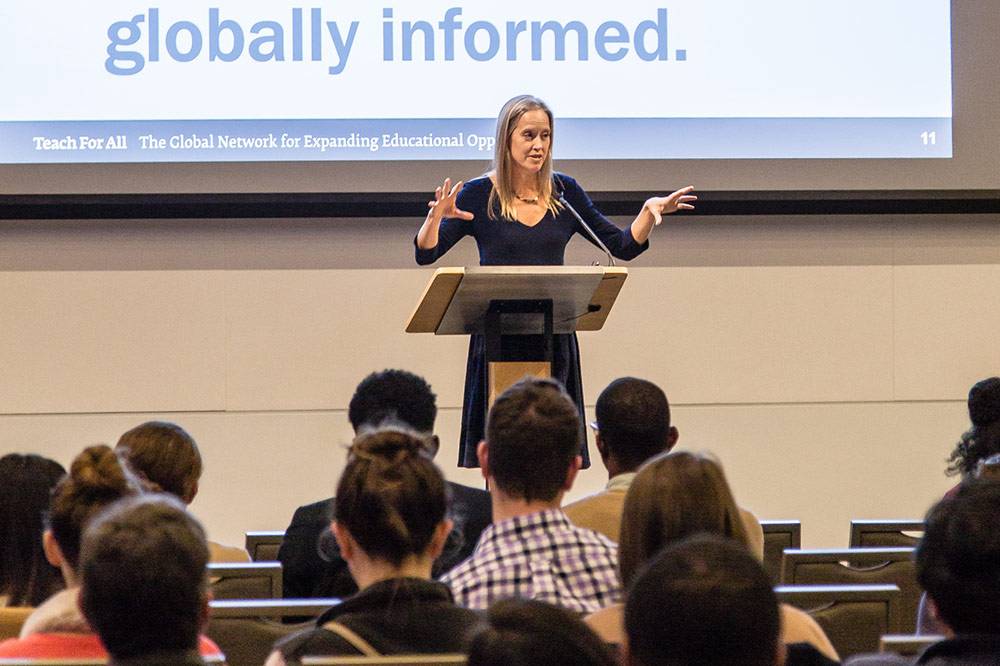Teach for America Founder: Talented People Are Key to Solving Problems

Social entrepreneur Wendy Kopp came to Duke’s Innovation and Entrepreneurship initiative Tuesday night to discuss how her senior thesis launched a program that has left its mark on K-12 education in America.
Kopp is the founder of Teach for America, a corps of recent graduates who are trained as teachers and sent out to underserved communities, where they commit to teaching for two years. She later co-founded Teach for All, which took the concept globally.
Founded in 1989, Teach for America has deployed 50,000 teachers to 53 communities. About 8,000 people are currently in teaching assignments, while the majority of alumni continue to work in areas related to the program’s mission, whether it be in education, administration or policy.
The organization was born out of a thesis Kopp researched and wrote while at Princeton titled “An Argument and Plan for the Creation of The Teacher Corps.”
Kopp came up with the idea because she and many of her peers were looking for a way to make a difference after graduation and weren’t finding it. Students who were graduating were being recruited by investment banking and other finance jobs.
And as a public policy major, she had become focused on educational inequities.
Kopp said the idea stemmed from the thought, “Why aren’t we being recruited as aggressively to teach for two years in our country’s most low-income communities as we are to work on Wall Street for two years?”
One year after she graduated, she was standing in an auditorium in front of 500 people who’d signed up to teach the first year – a number she said was naïve and difficult to manage in the organization’s infancy.
In 2007, Kopp co-founded Teach for All, an international effort to replicate her model in other countries.
Kopp said the Teach for All experience taught her “how much faster we can move when we’re learning from each other across borders. We’re finding that the problems are eerily similar, and the silver lining in that is that the solutions are shareable.”
It isn’t just about teaching kids, Kopp said, but also about shifting the type of education teachers are providing to kids, which she said is particularly relevant in the wake of the election and a volatile time in U.S. history.
In 2013, Kopp stepped away from her CEO role at Teach for America to focus on Teach for All. She remains an active member of Teach for America’s board.
Kopp advised student entrepreneurs that it’s important to start early because complex problems take a lot of time.
“I’m just so happy to have a shot at actually moving the needle in a big way during my lifetime,” she said.
Kopp added that youth and energy give social entrepreneurs an edge.
“Your inexperience is actually one of your biggest assets,” she said. “Once you start learning the way the world works, you start accepting the way things are and thinking it’s normal.”
Kopp also advised students to “get into the arena.”
“Really become immersed in communities and in the problem and the solution that you care most about,” she said. “Don’t start a social enterprise just to start a social enterprise.”
However, she cautioned, patience is key. Social entrepreneurs need to “embrace the long game” even though “we live in an era of quick fixes.”
Kopp’s last piece of advice was to be locally rooted and globally informed.
The main challenge to solving the world’s biggest social problems, she said, is a dearth of talented people working toward a solution. She told students that their choices mattered, that social causes needed to enlist the most energized and entrepreneurial people.
“You get into this stuff and you realize these problems are solvable,” she said. “The only question is whether enough of our most capable, committed and driven folks will channel their energy against them.”